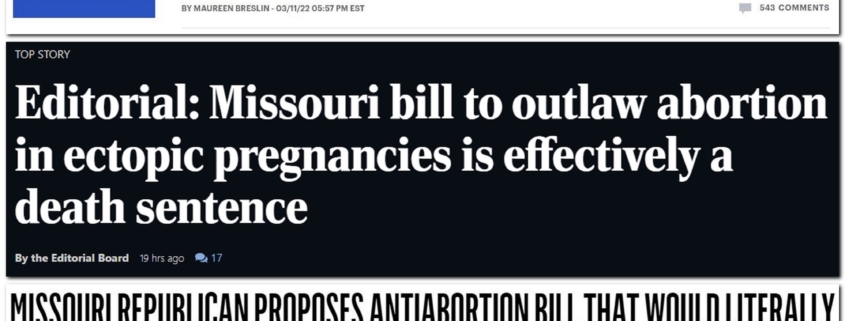No, Missouri is not outlawing treatment for ectopic pregnancy
A Missouri bill related to medication abortion has been getting a lot of attention:

While media hyperbole about abortion restrictions is typical, Missouri’s HB 2810 has confused even some staunch anti-abortion advocates with its mention of ectopic pregnancies. Part of the confusion is most likely due to the presentation of three different changes under two separate statutes:
388 RSMo (revised statutes of Missouri, which deals with professional licensing in the state of Missouri) has two revisions involved – 338.270 and 338.337.
188 RSMo (revised statutes of Missouri which deals with abortion laws) has one addition involved – 188.090.
The combination of the three is confusing but intentional for legal purposes. In conjunction, all three changes criminalize illegal importation or distribution of abortifacients in the state of Missouri. Here’s a breakdown of what the bill would do if it should pass.
Parts of this bill were created to amend and/or repeal statutes already on the books in Missouri. The first portion of the bill is written as follows:
Section A. Sections 338.270 and 338.337, RSMo, are repealed and three new sections enacted in lieu thereof, to be known as sections 188.090, 338.270, and 338.337
Revising sections 338.270 and 338.337 (pharmacists distributing abortion pills)
Sections 338.270 and 338.337 (which this bill repeals and reintroduces as revisions) regulate how pharmacies and pharmacists maintain licenses to sell prescription drugs in the state of Missouri. The sections remain virtually identical between repeal and revision. The only alteration is the addition of the following language [emphasis added]:
The board of pharmacy shall not issue or renew a nonresident pharmacy license if the applicant or licensee delivers directly to a patient within this state via common carrier, mail, carrier services, or any other delivery service any instrument, device, medicine, drug, or any other means or substance to be used for the purpose of performing or inducing an abortion, as defined in section 188.015.
And
It shall be unlawful for a licensed or registered out-of-state wholesale drug distributor, out-of-state pharmacy acting as a distributor, drug outsourcer, or third-party logistics provider to deliver directly to a patient within this state via common carrier, mail, carrier service, or any other delivery service any instrument, device, medicine, drug, or any other means or substance to be used for the purpose of performing or inducing an abortion, as defined in section 188.015.
This part of the revision would simply deny licensure to any out-of-state pharmacy or pharmacist distributing abortifacients. This part of the revision does not apply to in-state pharmacies. It also does not apply to pharmaceutical manufacturers, meaning in-state pharmacies and pharmacists will still be able to obtain these drugs directly from a manufacturer. It also only applies to those who are distributing these items by mail or delivery service.
Background on 188 RSMo (Missouri laws pertaining to abortion in general)
Some detractors are concerned this will affect physician’s ability to treat ectopic pregnancies due to the addition of section 118.090 to statute 188 RSMo.Statue 188 RSMo regulates abortion in Missouri, specifically in regard to when physicians are permitted to terminate a pregnancy. Note section 188.015 defines the word “abortion” for every section under 188 RSMo as:
(a) The act of using or prescribing any instrument, device, medicine, drug, or any other means or substance with the intent to destroy the life of an embryo or fetus in his or her mother’s womb; or (b) The intentional termination of the pregnancy of a mother by using or prescribing any instrument, device, medicine, drug, or other means or substance with an intention other than to increase the probability of a live birth or to remove a dead unborn child
Note that in the state of Missouri, by definition abortion is the intentional destruction of the embryo or fetus situated inside her mother’s womb (subsection a) or the termination of pregnancy with an explicit intention of preventing a live birth (subsection b). An ectopic pregnancy is always located outside of the mother’s womb and (with the exception of a few anomalous cases) will not result in a live birth – in fact most embryos involved in an ectopic pregnancy are also already dead by the time the defect is detected. This definition precludes an ectopic pregnancy from being classified as an abortion in the state of Missouri, in any context, including in the added section 188.090.
In addition, 188.090 concludes with the language “in violation of any state or federal law.” Missouri anti-abortion legislation (188.030.1 RSMo) permits abortion to save not only a woman’s life, but also her fertility. Section 188.375.6 permits a physician, in the case of an emergency, to bypass methods of termination/delivery which would benefit the child if the methods would further endanger the mother. In every way possible, when it comes to pregnancy emergencies, Missouri law favors pregnant women over their unborn children. This law does not apply to any physician treating an ectopic pregnancy, in any way, shape, or form.
Adding section 188.090 (providing abortion pills to women with ectopic pregnancies)
Which brings us to the section causing the most rancor: the addition of section 188.090, the one section most involved in protecting women’s health should she experience an ectopic pregnancy. But first, some background:
The risks of telemed abortion
Medical abortion now accounts for 54% of all abortions in the US. This percentage is expected to expand in the future. Recently there’s been an emboldened call for “self-managed” abortions using abortion pills–a call which only intensified during Covid shutdowns. While some telemed abortion providers do require testing (such as an ultrasound) before prescribing abortion pills, most don’t. This means telemed physicians often can’t assess a patient or confirm:
- Whether she is being coerced by someone outside of the camera’s view. (An estimated 60% of women report having been coerced into abortion by a parent or partner.)
- Her stage of pregnancy. (Risk of complications from mifepristone – including retention of fetal tissue and the need for a second abortion – increases after 10 weeks.)
- Whether the pregnancy is intrauterine or ectopic. (Ectopic pregnancies continue to expand even after the embryo has died; mifepristone has no effect on this process.)
Should a woman take mifepristone without an ultrasound an ectopic pregnancy may go unnoticed. Additionally, because the pain associated with a ruptured fallopian tube is very similar to the pain a woman is told to expect during “self-managed” abortion, she may delay seeking emergency medical care if her fallopian tube ruptures. This can be deadly.
In addition to these concerns, establishing proper follow-up care — for example assuring rhoGAM shots for RH negative patients — can be complicated with telemed abortion.
Missouri law regarding telemed abortion
In the US, abortion-by-mail is legal, but Missouri has decided a doctor must be in the same room with the patient when she begins a medication abortion.
In order for a provider or pharmacist to flout Missouri law, they would need to either be ineligible to provide medication abortion services in Missouri or be treating a woman who they know is ineligible for a legal medication abortion under state law. In these circumstances, Missouri law considers abortion pills to be illegal drugs, so revisions to the law loosely follow laws pertaining to other illegal drugs.
When circumstances involve the most vulnerable women (such as victims of human trafficking), or when the provider has previously been caught trafficking in abortion pills, the offender can be charged with a Class A felony, including a 20-to-life penalty. Most of the language which would trigger elevating a felony from Class B to Class A comes from RSMo 579.065.3.9 and 579.065.3.11, which details penalties for illegal drug distribution.
Because mifepristone does not terminate an ectopic pregnancy, and because an untreated ectopic pregnancy can be deadly, the proposed revision also assures anyone who gives a woman experiencing an ectopic pregnancy an illegal abortifacient will face 20-to-life. This penalty is similar to Missouri laws pertaining to an accidental death after an overdose, in which a dealer did not intend for his customer to die, but is held criminally liable for the death. This revision does not pertain to physicians treating women for ectopic pregnancies because (as explained above) terminating an ectopic pregnancy is not an abortion under Missouri law.
In summary
Missouri’s HB 2810 is not “a death sentence” and does not outlaw termination of ectopic pregnancy. Instead, it states:
- Pharmacists can’t distribute abortion-inducing drugs by mail or delivery service; out-of-state pharmacists can’t be licensed in Missouri if they import abortion-inducing drugs into Missouri
- Missouri law defines “abortion” such that treatment of ectopic pregnancies does not count as abortion. Physicians in Missouri can still treat ectopic pregnancies.
- Anyone who gives illegal abortion-inducing drugs to a woman with an ectopic pregnancy may be charged with a Class A felony.
Today’s guest author is Sarah St. Onge, who writes about child-loss, grief, and issues pertaining to continuing a pregnancy after a lethal anomaly has been diagnosed. You can read more of her work at shebringsjoy.com. She’s also a savethe1.com board member and founder of limbbodywallcomplex.net, a pro-life, diagnosis-specific website which supports parents who continue their pregnancy after receiving the same lethal diagnosis which took her daughter, Beatrix Elizabeth. You can find Sarah on Facebook, Twitter, and Instagram.
Post-publication update, 3/15/22: Missouri Representative Brian Seitz, who introduced HB 2810, has tweeted multiple times that the bill neither intends nor has the effect of preventing treatment of ectopic pregnancy and that, given such widespread disinformation about the bill, they will add a clarifying amendment to ensure that fact is absolutely clear:
Post-publication update, 3/23/22: House committee approves bill limiting abortion drugs, removes ectopic pregnancy language: A Missouri House committee approved the bill after removing language escalating “trafficking abortion-inducing drugs” from a Class B to Class A felony in cases in which a woman has an ectopic pregnancy or the abortion is prior to 10 weeks gestation. The bill’s sponsor (Rep. Seitz) is hopeful the bill will pass in the Missouri Senate and be signed by the governor.
If you appreciate our work and would like to help, one of the most effective ways to do so is to become a monthly donor. You can also give a one time donation here or volunteer with us here.




I feel like intentionally removing a living, ectopic embryo would have to be for “an intention OTHER than to increase the probability of a live birth or to remove a dead unborn child.” That ambiguity is what’s scary.